A bichon frisé is a small, fluffy dog breed that has captured the hearts of many pet owners. They have a distinctive appearance with their curly white coat and round black eyes, which give them an adorable and cuddly look. Their head is slightly rounded with long ears that hang down to their cheeks. The bichon frisé’s nose is black, and they have a short muzzle with a scissor bite. They also have short legs but are well-proportioned for their size.
In terms of size, the bichon frisé typically weighs between 12-18 pounds and stands at about 9-11 inches tall at the shoulder. Their fur is hypoallergenic due to its curly texture, and they don’t shed much, making them an ideal choice for people who suffer from allergies.
Overall, the bichon frisé’s appearance exudes charm and elegance while still maintaining its playful nature – it’s no wonder why this breed remains popular among dog lovers everywhere!
Lifespan
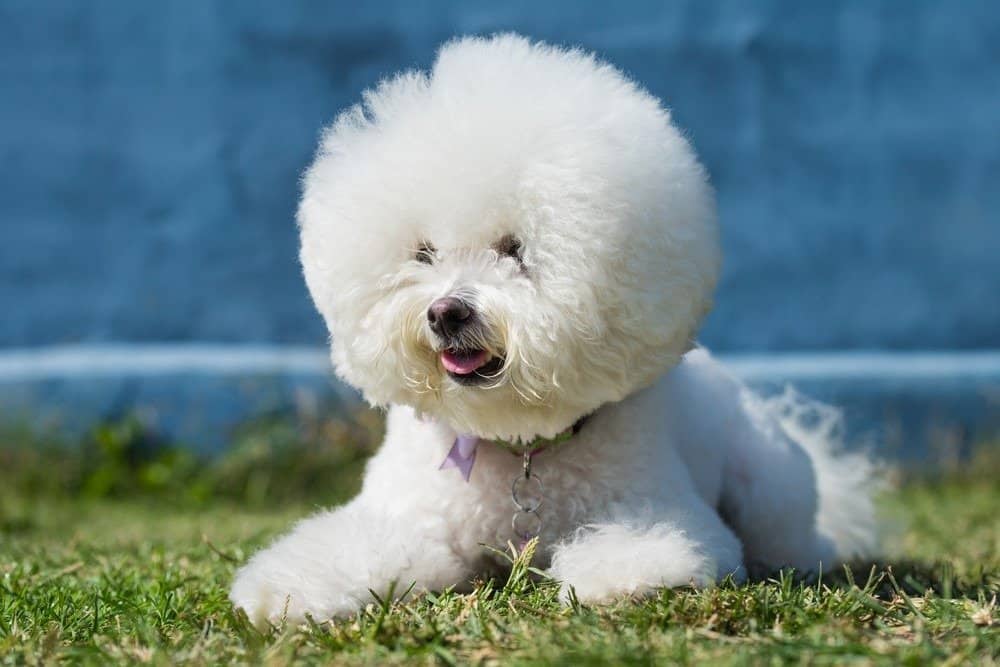
The average lifespan of a bichon frisé is between 14-15 years.
©Radovancev Zarko/Shutterstock.com
If you are considering getting a bichon frisé, it is important to know its average lifespan. On average, bichon frisé dogs live between 14 to 15 years. However, there are several factors that can affect their lifespan.
One of the most crucial factors is genetics. Like with any other breed of dog, some lines may be predisposed to certain health conditions that could shorten their lives. It’s essential to do your research and choose a reputable breeder who has done all necessary genetic testing on both parents before breeding.
Another factor affecting lifespan is overall health and care. Proper nutrition, exercise, and regular veterinary check-ups can help ensure your bichon frisé stays healthy throughout its life. Being overweight or under-exercised can lead to various health issues, such as diabetes or heart disease, which can ultimately decrease lifespan.
Lastly, environmental factors also play a role in determining how long your furry friend will live. Exposure to toxins like pesticides and household cleaners poses significant risks for dogs’ overall health.
In conclusion, if you provide quality care for your bichon frisé while ensuring they’re from a reputable breeder with no genetic defects, then they should have a good chance at living an extended life span of 15 years old!
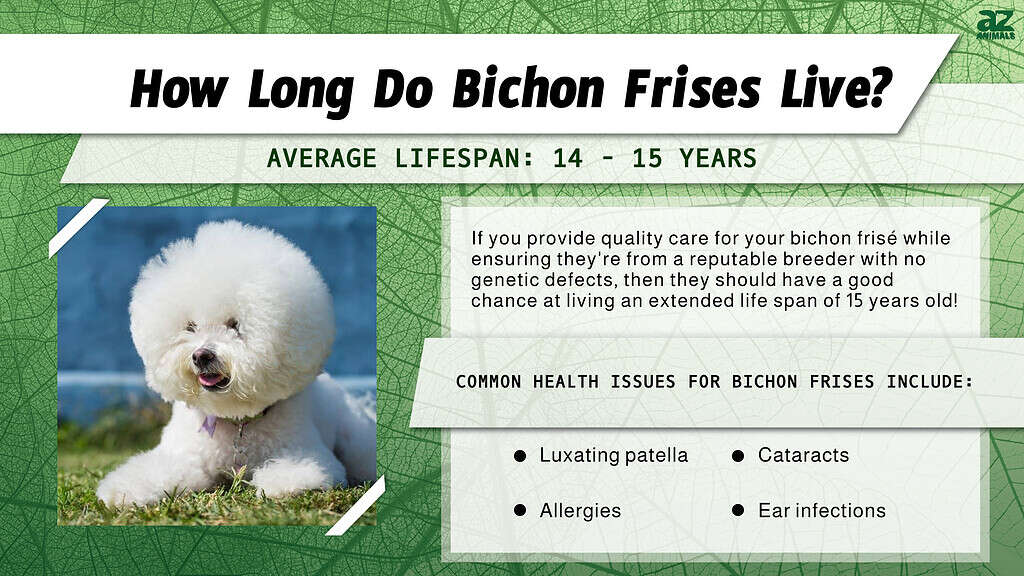
History and Origins
The group of small white dogs known as Barbichon types, which includes the Havanese, Bolognese, and Maltese, is thought to have started its modern development on Tenerife, the biggest island of the Canary Islands. Sailors of the island adored one particular breed so much that it was named Bichon Tenerife, the ancestor of today’s bichon frisé. This breed became popular with the royal courts of Italy, Spain, and France from the 13th century and especially during the Renaissance.
The bichon frisé was once a beloved lapdog of the wealthy, but with the start of the French Revolution in 1789, their owners were taken away, and the dogs had to start fending for themselves. Fortunately, street performers took in these intelligent and attractive pooches and trained them to be circus performers. Bichons were great at performing and captivating audiences, making them a popular choice for show business.
In the twentieth century, the bichons were affected by the lack of resources due to the two world wars. Fortunately, some nice people saved them from the streets of France and Belgium, which allowed them to survive. The Bichon Frise Club of America was established in San Diego in 1964, and the AKC accepted them into the Miscellaneous class in 1971, granting them full recognition in the Non-Sporting Group a year later.
Health
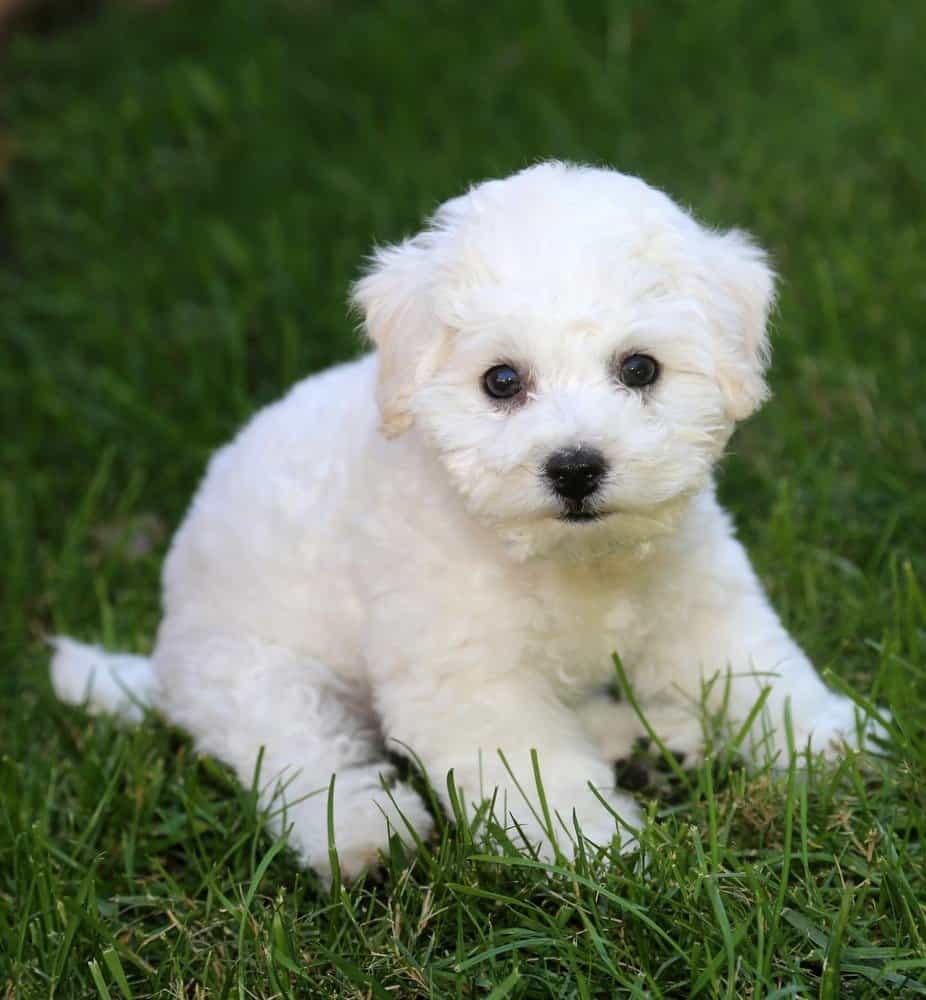
Ensuring that your bichon has a balanced diet and good oral hygiene gives them a better chance of a healthy life.
©mikeledray/Shutterstock.com
Bichon frisés are known to be generally healthy dogs. However, it is important for a responsible breeder to screen their breeding stock for potential health conditions such as bladder infections, allergies, luxating patella (a condition where the kneecap dislocates from its normal position), and cataracts or other eye diseases that may affect the breed. This will help ensure that your bichon frisé puppy has a better chance of living a long and healthy life.
One of the most common issues that bichons can experience is complications from gum infections and tooth loss if regular brushing and dental care are not made a priority. Therefore, it is crucial to implement proper oral hygiene practices into your dog’s daily routine in order to maintain good dental health.
In addition, ear infections are also commonly seen in bichons due to their floppy ears, which can trap moisture and bacteria. Thus, cleaning your dog’s ears regularly with specialized solutions can help prevent these infections from occurring.
Finally, regular visits to the vet are essential in ensuring optimal health for your furry friend. During these visits, an evaluation of their hips and patellas should be conducted by a veterinarian who will recommend appropriate treatment plans if there are any abnormalities found.
Overall, bichon frisés tend to have fewer health problems compared to some other breeds. Nevertheless, taking preventative measures such as those mentioned above can significantly improve the lifespan and quality of life of this beloved companion animal species.
Grooming
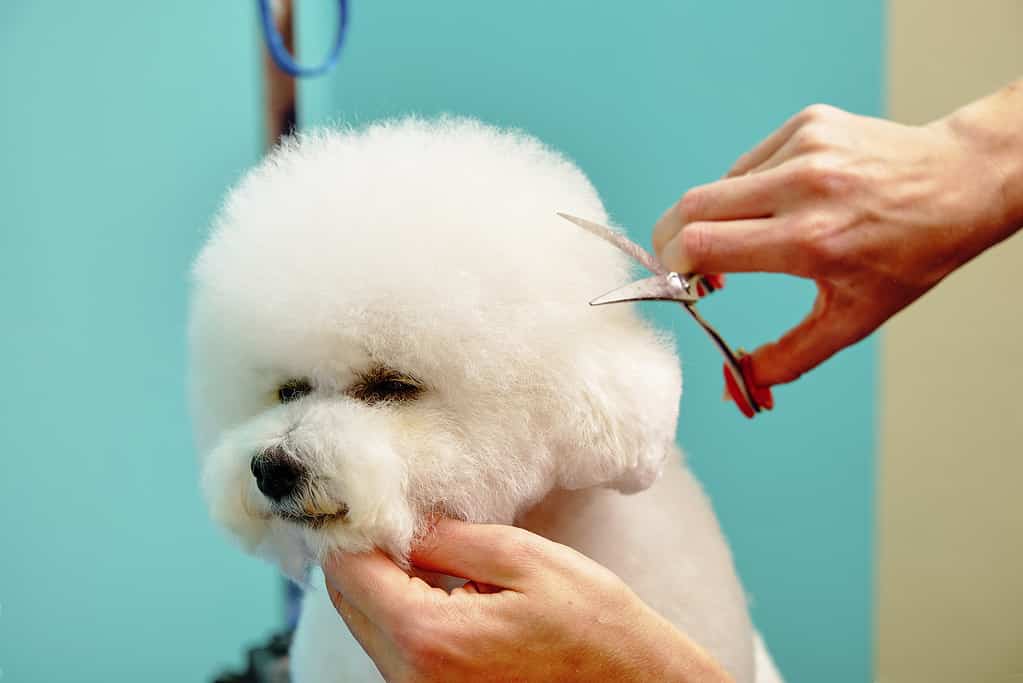
In addition to regular brushing, bichons should visit the groomer every four to six weeks.
©iStock.com/Ihar Halavach
The bichon frisé is a relatively high-maintenance dog when it comes to grooming. Its fluffy, curly coat requires regular brushing to prevent mats and tangles from forming. Ideally, owners should brush their bichon at least two or three times a week, but daily brushing is even better. This will help remove loose hair and keep the coat looking clean and healthy.
In addition to regular brushing, bichons also need regular baths and clippings. Most pet owners take their bichons to the groomer every four to six weeks for this kind of maintenance, but owners who show their dogs often learn how to do it themselves.
One advantage of owning a bichon is that they are considered hypoallergenic due to minimal shedding. However, this doesn’t mean that they don’t require any grooming – in fact, keeping up with regular brushing is even more important for allergy sufferers as it helps prevent allergens from building up in the home.
Finally, like all breeds of dogs, bichons also need routine nail care. Long nails can be uncomfortable for your pet and can cause them pain or difficulty walking if left unattended for too long. Regular trimming by either yourself or a professional will keep your pup’s paws healthy and comfortable!
Exercise
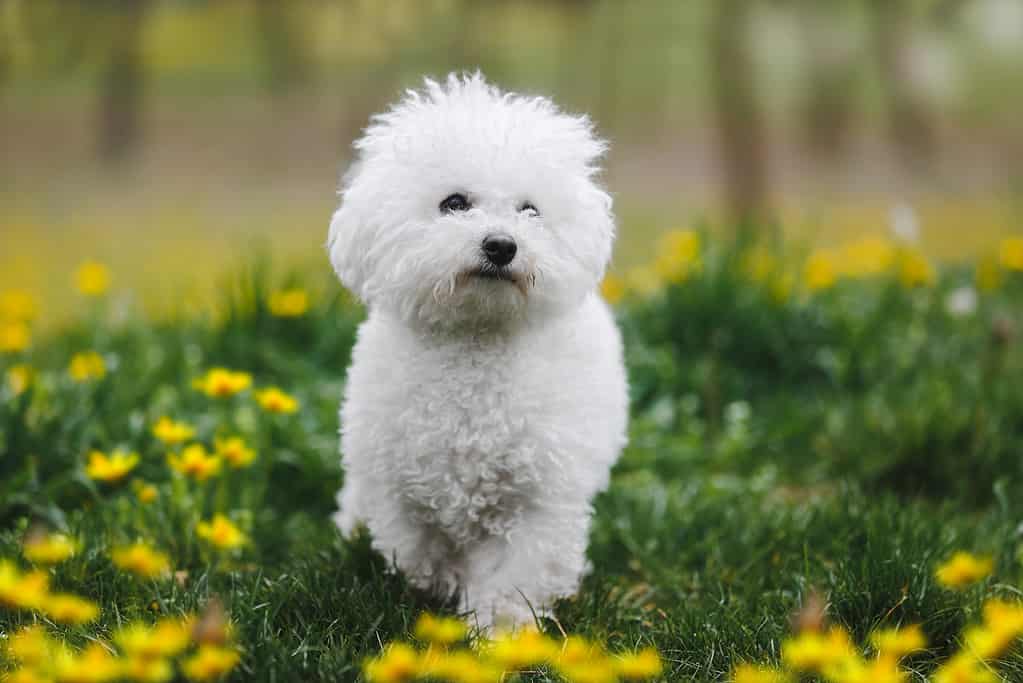
It’s important to ensure that your bichon gets enough exercise on a daily basis through playing and walking.
©iStock.com/SStajic
Bichon frisés are generally considered to be somewhat active dogs, but this doesn’t mean that they require a lot of exercise. In fact, bichons tend to have long stretches of calm interspersed with brief bursts of high activity. These little bursts often involve running around the house or yard at full speed and can provide a good workout for your furry friend.
However, it is important to ensure that your bichon gets enough exercise on a daily basis. This means setting aside time for play sessions as well as walks. While having another dog as an exercise companion can be beneficial, it’s still important for you to spend quality playtime with your bichon.
If you have a fenced-in backyard, this can be an excellent place for your bichon to burn off some energy without the risk of escaping into the wider world. However, it’s worth remembering that these dogs are surprisingly fast and agile – if they do manage to make a break for freedom, catching them or calling them back can be difficult.
Many bichons enjoy participating in obedience training classes and agility competitions. These activities not only provide mental stimulation but also help keep your dog fit and healthy.
Overall, while bichons may not require hours of intense physical activity each day as some breeds do, regular exercise is still vital in keeping them happy and healthy throughout their lives.
Training
When it comes to training a bichon frisé, early socialization, and puppy classes are highly recommended. These dogs have a reputation for being difficult to housebreak, so starting their training as soon as possible can help them learn the rules of the house more quickly. Despite this one area of potential difficulty, bichons are generally very easy to train in other respects.
These adorable little dogs love nothing more than performing tricks and learning new ones quickly. They respond well to positive rewards-based training methods, which means that harsh or negative methods should be avoided at all costs.
One thing that is particularly important when it comes to training a bichon frisé is making sure they feel like part of the family. These dogs thrive on human interaction and need plenty of attention from their owners. If left alone for long periods of time regularly, undesirable behaviors may start to develop.
Overall, with proper socialization and consistent training based on positive reinforcement techniques, your bichon frisé can become a well-behaved and loving companion for many years to come!
Nutrition
To ensure that your bichon frisé has a long and healthy life, nutrition is a key factor to consider. Feeding your dog with high-quality dog food, whether commercially manufactured (or home-cooked under the supervision and approval of your veterinarian), is essential. It’s important to choose a diet that suits their age – whether adult, senior, or puppy – as this will provide them with the right nutrients they need at each stage of their lives.
However, it’s also vital to be aware that some bichon frisés can easily become overweight if not monitored carefully. Therefore, keeping an eye on calorie consumption and weight levels is crucial in maintaining a healthy body condition for your fur baby. While treats play an important role in training sessions, giving too many can cause obesity which may lead to various health issues such as heart disease and diabetes.
It’s worth noting that certain human foods are safe for dogs, while others aren’t appropriate for canine consumption. If you’re unsure about what foods are suitable or have concerns about your pet’s diet or weight gain/loss, then consulting with a vet would be advisable.
Furthermore, providing clean, fresh water at all times will keep them hydrated throughout the day. Ensuring they receive highly nutritious food while staying at an ideal weight is vital in increasing their lifespan as well as enhancing their overall quality of life.
Is a Bichon Frisé Right for You?
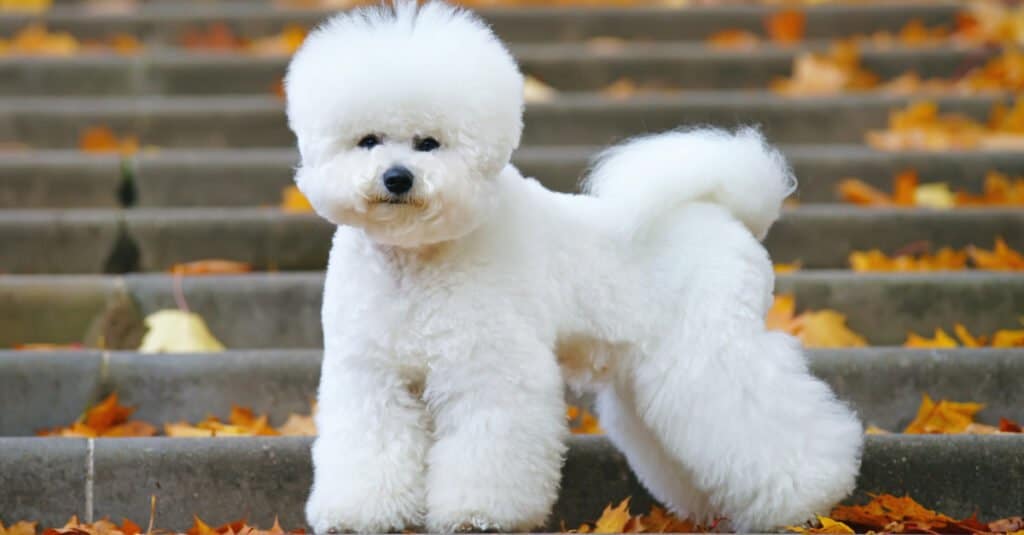
With their curly white coat, round black eyes, and friendly nature, the bichon frisé has captured the hearts of pet parents around the world.
©Eudyptula/Shutterstock.com
The bichon frisé is a breed of dog that has captured the hearts of people around the world. These pint-sized pups are known for their beauty, charm, and intelligence, which have helped them to survive through history’s ups and downs. Despite their small size, bichons are robust and resilient dogs who stand just under a foot tall at the shoulder. They boast a beautiful white hypoallergenic coat that is plush and velvety to the touch.
One of the most striking features of the bichon frisé is its rounded head of hair that sets off its large dark eyes and black nose and lips. This unique appearance has made these dogs famous throughout history, as they were often kept by royalty as lapdogs or companion animals.
Bichons are adaptable companions who get along well with other dogs and children alike. They are alert, curious little watchdogs but prefer love over fighting any day! Their confidence in themselves makes them ideal city dogs, as they can handle all sorts of environments without getting overwhelmed easily.
Training bichons is usually quite easy due to their intelligent nature – plus, they enjoy performing tricks for those closest to them! Finally, there’s something about these happy-go-lucky dogs’ personalities that draws smiles wherever they go; it’s no wonder why so many people fall in love with this breed at first sight!
Overall if you’re looking for an affectionate companion who will always be by your side, then look no further than a bichon frisé!
The photo featured at the top of this post is © Ieva Tvaronavicute/Shutterstock.com
Thank you for reading! Have some feedback for us? Contact the AZ Animals editorial team.







